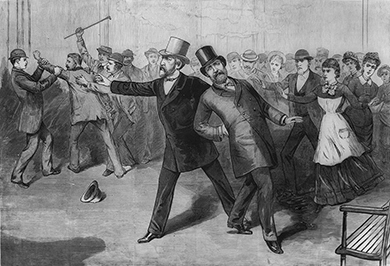| << Chapter < Page | Chapter >> Page > |
Hayes’ first target in his meager reform effort was to remove Chester A. Arthur, a strong Conkling man, from his post as head of the New York City Customs House. Arthur had been notorious for using his post as customs collector to gain political favors for Conkling. When Hayes forcibly removed him from the position, even Half-Breeds questioned the wisdom of the move and began to distance themselves from Hayes. The loss of his meager public support due to the Compromise of 1877 and the declining Congressional faction together sealed Hayes fate and made his reelection impossible.
In the wake of President Hayes’ failure, Republicans began to battle over a successor for the 1880 presidential election. Initially, Stalwarts favored Grant’s return to the White House, while Half-Breeds promoted their leader, James Blaine. Following an expected convention deadlock, both factions agreed to a compromise presidential candidate, Senator James A. Garfield of Ohio, with Chester Arthur as his vice-presidential running mate. The Democratic Party turned to Winfield Scott Hancock, a former Union commander who was a hero of the Battle of Gettysburg, as their candidate.
Garfield won a narrow victory over Hancock by forty thousand votes, although he still did not win a majority of the popular vote. But less than four months into his presidency, events pushed civil service reform on the fast track. On July 2, 1881, Charles Guiteau shot and killed Garfield ( [link] ), allegedly uttering at the time, “I am a Stalwart of Stalwarts!” Guiteau himself had wanted to be rewarded for his political support—he had written a speech for the Garfield campaign—with an ambassadorship to France. His actions at the time were largely blamed on the spoils system, prompting more urgent cries for change.

I executed
the Divine command.
And Garfield did remove,
To save my party,
and my country
From the bitter fate of War.
—Charles Guiteau
Charles Guiteau was a lawyer and supporter of the Republican Party, although not particularly well known in either area. But he gave a few speeches, to modest crowds, in support of the Republican nominee James Garfield, and ultimately deluded himself that his speeches influenced the country enough to cause Garfield’s victory. After the election, Guiteau immediately began pressuring the new president, requesting a post as ambassador. When his queries went unanswered, Guiteau, out of money and angry that his supposed help had been ignored, planned to kill the president.
He spent significant time planning his attack and considered weapons as diverse as dynamite and a stiletto before deciding on a gun, stating, “I wanted it done in an American manner.” He followed the president around the Capitol and let several opportunities pass, unwilling to kill Garfield in front of his wife or son. Frustrated with himself, Guiteau recommitted to the plan and wrote a letter to the White House, explaining how this act would “unite the Republican Party and save the Republic.”
Guiteau shot the president from behind and continued to shoot until police grabbed him and hauled him away. He went to jail, and, the following November after Garfield had died, he stood trial for murder. His poor mental health, which had been evident for some time, led to eccentric courtroom behavior that the newspapers eagerly reported and the public loved. He defended his case with a poem that used religious imagery and suggested that God had ordered him to commit the murder. He defended himself in court by saying, “The doctors killed Garfield, I just shot him.” While this in fact was true, it did not save him. Guiteau was convicted and hanged in the summer of 1882.

Notification Switch
Would you like to follow the 'U.s. history' conversation and receive update notifications?